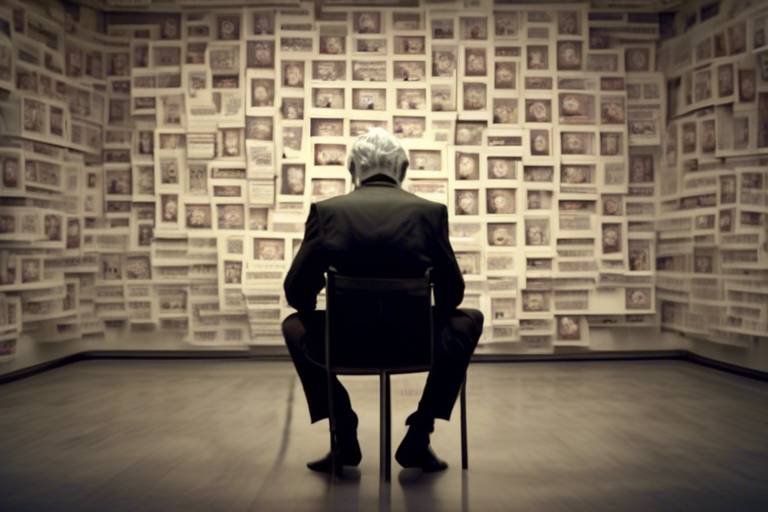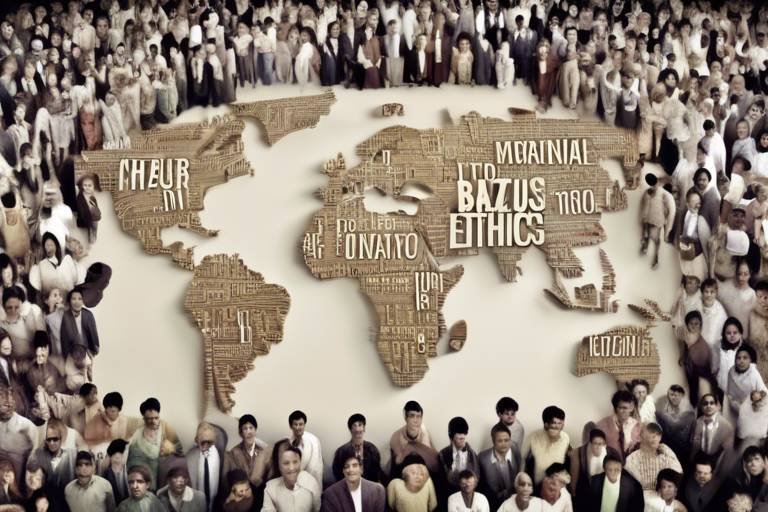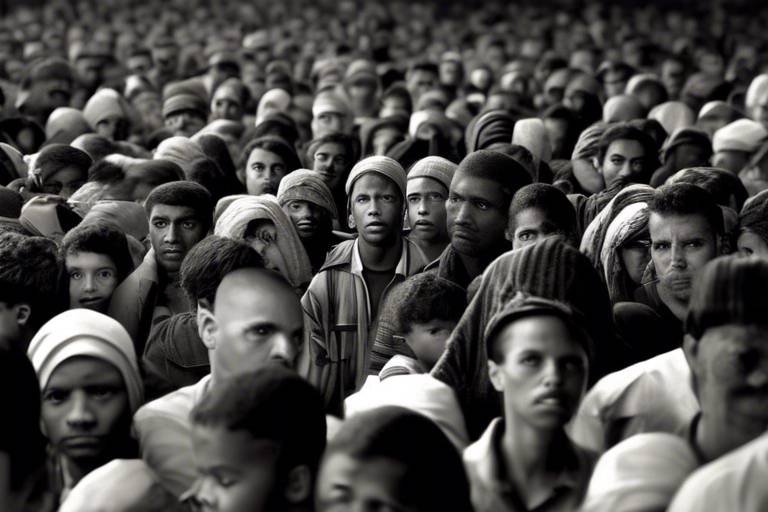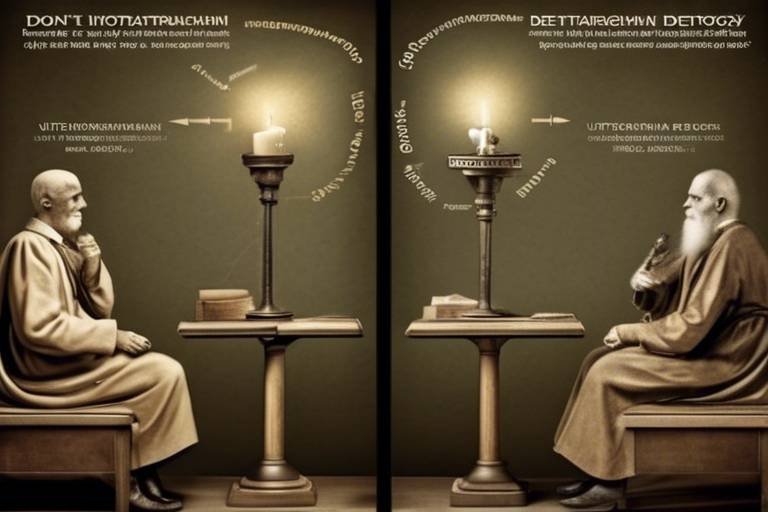Understanding the Ethics of Diplomacy
In an increasingly interconnected world, the role of diplomacy has never been more critical. But what exactly does it mean to practice diplomacy ethically? The ethics of diplomacy encompass a complex web of principles that guide diplomats in their interactions with other nations. It’s not just about making deals or negotiating treaties; it’s about navigating the murky waters of moral responsibility while fostering international relations. Think of it as walking a tightrope—balancing national interests with global responsibilities can be a daunting task, but it’s essential for maintaining peace and cooperation among countries.
At the heart of diplomatic ethics lie fundamental principles such as honesty, integrity, and respect for sovereignty. These values are the cornerstones that diplomats must uphold to effectively navigate their responsibilities on the world stage. Imagine being a diplomat as a captain of a ship; you need a reliable compass to steer through the vast ocean of international relations. Without these ethical foundations, the ship risks capsizing in turbulent waters.
Furthermore, the ethical landscape is shaped by various factors, including international law and cultural differences. These elements create a framework that not only outlines acceptable behavior but also influences how diplomats engage with one another. For instance, the Vienna Convention on Diplomatic Relations serves as a critical guide, defining the rights and responsibilities of diplomats while promoting ethical conduct globally. It’s akin to having a rulebook in a game; without it, players might not know how to act, leading to chaos.
As we dive deeper into the ethical considerations of diplomacy, it becomes evident that the challenges are multifaceted. Diplomats often find themselves at a crossroads, having to make decisions that could favor national interests at the expense of global welfare. This ethical dilemma is not just a theoretical concern; it’s a real-world challenge that requires a delicate balance. By understanding these complexities, we can better appreciate the importance of fostering a culture of ethical diplomacy that resonates across borders.
- What are the main ethical principles in diplomacy? The main principles include honesty, integrity, and respect for sovereignty, which guide diplomats in their international dealings.
- How does international law influence diplomatic ethics? International law provides a framework for state behavior, helping diplomats adhere to legal obligations and promoting peace.
- What is the Vienna Convention? The Vienna Convention is a treaty that outlines the rights and responsibilities of diplomats, promoting ethical conduct in international relations.
- Are there exceptions to diplomatic immunity? Yes, there are exceptions, particularly in cases of serious offenses, which raise questions about accountability.
- How can cultural differences impact diplomatic ethics? Cultural differences can influence ethical decision-making and communication, making it essential for diplomats to be culturally aware.

The Foundations of Diplomatic Ethics
When we dive into the world of diplomacy, it's like stepping into a complex web of relationships, where the threads are woven with honesty, integrity, and respect for sovereignty. These principles form the bedrock of diplomatic ethics, acting as guiding stars for diplomats navigating the often turbulent waters of international relations. Just imagine a ship at sea; without a compass, it could easily lose its way. Similarly, diplomats rely on these ethical foundations to steer their actions and decisions in a manner that upholds their nation's values while respecting the rights of others.
Honesty, for instance, is not just about telling the truth; it's about being transparent in intentions and dealings. When diplomats engage with their counterparts, they must be clear about their objectives, fostering an environment of trust. This trust is essential because, without it, negotiations can quickly devolve into suspicion and conflict. Integrity complements honesty, as it requires diplomats to adhere to their commitments and promises. Imagine a friend who always keeps their word; that reliability strengthens bonds. In the same way, diplomats who demonstrate integrity build lasting relationships that can weather crises.
Respect for sovereignty is another cornerstone of diplomatic ethics. Each nation has its own unique identity, culture, and political structure. Diplomats must recognize and honor these differences, understanding that every country has the right to govern itself without external interference. This respect not only promotes peaceful coexistence but also facilitates cooperation on global issues. Think of it like a neighborhood where everyone respects each other's property lines; it creates a harmonious living environment. In the diplomatic realm, respecting sovereignty is crucial for maintaining stability and fostering collaboration.
However, the path of diplomatic ethics is not always smooth. There are moments when the interests of one nation may clash with the principles of another. For example, a country might prioritize its national security over humanitarian concerns, leading to ethical dilemmas. In such cases, diplomats must weigh their decisions carefully, considering not only their national interests but also the broader implications for global peace and cooperation. This balancing act requires a deep understanding of both ethical principles and the complexities of international relations.
To further illustrate these foundational principles, let's take a look at the following table that summarizes the key components of diplomatic ethics:
| Principle | Description |
|---|---|
| Honesty | Being transparent in intentions and dealings to build trust. |
| Integrity | Adhering to commitments and promises to strengthen relationships. |
| Respect for Sovereignty | Recognizing and honoring the unique identity and rights of each nation. |
In conclusion, the foundations of diplomatic ethics are essential for effective international relations. They guide diplomats in their interactions, helping them to navigate challenges while promoting peace and cooperation. By embracing these principles, diplomats can not only fulfill their responsibilities but also contribute to a more harmonious world.

The Role of International Law
International law serves as a cornerstone in the realm of diplomacy, acting as a guiding compass for how nations interact with one another. It establishes a set of rules and norms that countries are expected to follow, creating a framework within which diplomats operate. This legal structure is essential for promoting peace, stability, and cooperation among nations. Without it, the world would be a chaotic arena where might often makes right, leading to conflicts and misunderstandings.
One of the primary functions of international law is to outline the rights and responsibilities of states. This includes everything from trade agreements to human rights obligations. For diplomats, understanding these legal parameters is crucial. It allows them to advocate effectively for their countries while ensuring that they remain compliant with global standards. By adhering to international law, diplomats not only protect their nation's interests but also contribute to a more orderly international system.
The impact of international law on diplomatic ethics cannot be overstated. It helps diplomats navigate complex situations by providing a framework for ethical behavior. For instance, when negotiating treaties or resolving disputes, diplomats are guided by principles enshrined in international law. This adherence to legal norms fosters trust and credibility, which are essential for successful diplomatic relations.
To illustrate the significance of international law in diplomacy, consider the following key areas:
- Conflict Resolution: International law provides mechanisms for resolving disputes peacefully, such as arbitration and mediation.
- Human Rights: Treaties like the Universal Declaration of Human Rights set standards that diplomats must respect and promote.
- Trade Relations: International trade agreements establish rules that facilitate economic cooperation and reduce the likelihood of conflicts.
Moreover, the evolving nature of global challenges—such as climate change, terrorism, and cyber threats—demands that international law adapt accordingly. Diplomats must be aware of these changes and how they influence ethical considerations in their work. For instance, the Paris Agreement on climate change is an example of how international law can guide nations toward a common goal while emphasizing ethical responsibilities toward future generations.
In summary, international law is not just a set of rules; it is a vital instrument that shapes the ethical landscape of diplomacy. By providing a clear framework for state behavior, it enables diplomats to navigate their roles effectively while fostering international cooperation. Understanding and adhering to these laws is crucial for diplomats aiming to build lasting relationships and promote global stability.
- What is the primary purpose of international law? International law aims to regulate the relations between states, ensuring that interactions are conducted under agreed-upon rules to promote peace and cooperation.
- How does international law influence diplomatic negotiations? International law provides guidelines and frameworks that help diplomats navigate negotiations, ensuring that they adhere to legal standards while representing their national interests.
- Why is it important for diplomats to understand international law? Understanding international law is essential for diplomats to ensure compliance with legal obligations, promote ethical behavior, and foster trust in international relations.

The Vienna Convention
The Vienna Convention on Diplomatic Relations, adopted in 1961, serves as a cornerstone of international diplomacy. This treaty outlines the rights and responsibilities of diplomats and establishes a comprehensive framework that governs diplomatic interactions between states. At its core, the Convention aims to ensure that diplomatic missions operate smoothly and effectively, allowing diplomats to foster international relations without unnecessary hindrances. Imagine trying to build a bridge between two countries; the Vienna Convention provides the blueprints, ensuring that each diplomat knows their role and the boundaries within which they must operate.
One of the key aspects of the Vienna Convention is its emphasis on ethical conduct. By setting clear guidelines, it not only protects diplomats but also upholds the integrity of international relations. For instance, the Convention stipulates that diplomats are entitled to certain privileges, including diplomatic immunity, which shields them from legal prosecution in the host country. This immunity is crucial because it allows diplomats to perform their duties without the fear of being hindered by local laws or political pressures. However, this same immunity raises important ethical questions, such as how far it should extend and what responsibilities diplomats have to their host nations.
To illustrate the key provisions of the Vienna Convention, consider the following table that summarizes its main points:
| Key Provision | Description |
|---|---|
| Diplomatic Immunity | Protection from legal action in the host country, allowing diplomats to perform their duties without interference. |
| Inviolability of Diplomatic Premises | Diplomatic missions cannot be entered by local authorities without consent, ensuring the safety and security of diplomats. |
| Freedom of Communication | Diplomats have the right to communicate freely with their home country, which is essential for effective diplomacy. |
| Respect for Local Laws | While enjoying immunity, diplomats must also respect the laws of the host country, highlighting the balance between privilege and responsibility. |
While the Vienna Convention provides a robust framework for diplomatic ethics, it is not without its challenges. For example, the concept of diplomatic immunity can sometimes be misused, leading to tensions between host countries and diplomatic missions. This misuse raises critical questions about accountability and the ethical obligations that diplomats have towards the societies in which they operate. Therefore, it is essential for diplomats to navigate these waters with a keen sense of responsibility, ensuring that their actions align with both international standards and local expectations.
In conclusion, the Vienna Convention is more than just a legal document; it is a vital instrument that shapes the ethical landscape of diplomacy. By understanding and adhering to its principles, diplomats can better serve their nations while fostering a climate of mutual respect and cooperation on the global stage.
- What is the purpose of the Vienna Convention? The Vienna Convention outlines the rights and responsibilities of diplomats, ensuring smooth diplomatic relations between countries.
- What does diplomatic immunity mean? Diplomatic immunity protects diplomats from legal prosecution in the host country, allowing them to perform their duties without interference.
- Are there exceptions to diplomatic immunity? Yes, there are exceptions, especially in cases of serious offenses, where accountability may be considered.
- How does the Vienna Convention promote ethical conduct? By establishing guidelines for behavior, the Convention encourages diplomats to act with integrity and respect for the host country.

Diplomatic immunity is a cornerstone of the Vienna Convention on Diplomatic Relations, which was established in 1961. This principle is designed to ensure that diplomats can perform their duties without fear of harassment or legal consequences. Imagine being a diplomat tasked with fostering international relations; the last thing you need is to be bogged down by local laws that may not align with your home country's interests. This immunity allows diplomats to operate freely, promoting dialogue and cooperation between nations. However, it doesn't come without its complexities and ethical dilemmas.
While diplomatic immunity is essential for maintaining smooth international relations, it raises significant ethical questions. For instance, when a diplomat commits a crime, should they be held accountable? The immunity granted to them can sometimes create a perception of a "get-out-of-jail-free card," leading to public outrage and diplomatic tensions. It's a double-edged sword: on one side, it protects diplomats from undue interference; on the other, it can be seen as a shield for unethical behavior. This dichotomy forces us to consider the implications of such immunity on international law and moral standards.
To better understand the scope of diplomatic immunity, it's important to recognize the different categories it encompasses. Here’s a brief overview:
| Type of Immunity | Description |
|---|---|
| Personal Immunity | Protects diplomats from arrest and detention. |
| Functional Immunity | Covers actions performed in official capacity, shielding diplomats from legal proceedings. |
| Inviolability of Premises | Diplomatic missions cannot be entered or searched without permission. |
The ethical boundaries of diplomatic immunity become even murkier when we consider exceptions. For example, diplomats can be expelled from the host country if they engage in serious crimes, such as drug trafficking or violent offenses. This leads to a critical question: how do we define "serious offenses"? The ambiguity surrounding this term can lead to inconsistent applications of diplomatic immunity, creating a patchwork of accountability that varies across different nations and cultures.
In conclusion, while diplomatic immunity is vital for facilitating international dialogue, it comes with ethical responsibilities. Diplomats must navigate these complexities with care, ensuring they uphold the moral standards expected of them. As we move forward in an increasingly interconnected world, the conversation around diplomatic immunity will undoubtedly evolve, demanding greater transparency and accountability from those who wield it.

Exceptions to Immunity
While diplomatic immunity is a cornerstone of international relations, it is not an absolute shield for diplomats. There are specific exceptions that highlight the delicate balance between protecting diplomats and ensuring accountability for their actions. Understanding these exceptions is crucial for anyone involved in or studying diplomacy, as they illuminate the ethical boundaries that diplomats must navigate.
One of the primary exceptions to diplomatic immunity pertains to serious criminal offenses. For instance, if a diplomat commits a crime such as murder, human trafficking, or other heinous acts, host countries may have the right to take legal action, including expulsion. This principle emphasizes that while diplomats are protected in their official capacities, they are not above the law when it comes to egregious violations that threaten public safety.
Another significant exception involves civil cases. If a diplomat is involved in a commercial dispute or a case related to personal injury, the immunity may not apply. For example, if a diplomat is involved in a car accident resulting in damages, the host country can pursue legal action to address the incident. This exception ensures that diplomats can be held accountable for their personal actions, particularly when they occur outside the scope of their official duties.
Furthermore, the Vienna Convention on Diplomatic Relations itself outlines conditions under which immunity does not apply. According to Article 31, immunity does not extend to acts performed outside of official functions. This means that if a diplomat engages in activities unrelated to their diplomatic role, they may be subject to the laws of the host country. This provision is essential in maintaining a sense of justice and fairness, preventing diplomats from abusing their status.
In summary, while diplomatic immunity is designed to protect diplomats and facilitate their work, it is essential to recognize that there are crucial exceptions. These exceptions serve to uphold ethical standards and ensure that diplomats remain accountable for their actions, particularly in serious cases. Understanding these boundaries is vital for fostering a culture of ethical diplomacy.
- What is diplomatic immunity? Diplomatic immunity is a legal privilege that protects diplomats from being prosecuted or sued in the host country, allowing them to perform their duties without interference.
- Are there any limits to diplomatic immunity? Yes, diplomatic immunity does not protect diplomats from serious crimes or civil cases unrelated to their official duties.
- What happens if a diplomat commits a serious crime? Depending on the severity of the crime, the host country may expel the diplomat or take legal action, although prosecution is generally not possible.
- Can diplomats be held accountable for personal actions? Yes, diplomats can be held accountable for personal actions, especially if they occur outside their official functions.

Challenges in Ethical Diplomacy
Diplomacy, at its core, is about building bridges between nations, but the journey is often fraught with ethical dilemmas that can make even seasoned diplomats pause. One of the most significant challenges is the constant balancing act between national interests and global responsibilities. Imagine a tightrope walker, carefully placing one foot in front of the other while trying not to lose their balance—this is akin to the daily reality for diplomats navigating the complex terrain of international relations.
In many instances, diplomats are faced with situations where their home country's priorities may clash with the principles of justice and fairness. For example, a diplomat might be under pressure to support a trade agreement that benefits their nation economically but could potentially harm the environment or infringe upon human rights in the partner country. This creates a moral quandary: should they prioritize their nation's economic gain or uphold ethical standards that promote global welfare?
Moreover, the pressure of public opinion cannot be overlooked. In our interconnected world, information travels fast, and any perceived ethical misstep can lead to public outrage. Diplomats must not only consider the immediate implications of their actions but also how they will be perceived by both domestic and international audiences. This adds another layer of complexity to their decision-making processes.
Another challenge lies in the ambiguities of international relations. What may be considered an ethical practice in one culture might be viewed as unethical in another. For instance, some countries might prioritize negotiation and compromise, while others may value assertiveness and strength. This divergence can lead to misunderstandings and conflicts that further complicate diplomatic efforts. Understanding and respecting these cultural differences is crucial, yet it requires a deep level of cultural intelligence and adaptability.
To help navigate these challenges, diplomats often rely on various strategies. Here are some key approaches:
- Open Dialogue: Maintaining open lines of communication can help clarify intentions and mitigate misunderstandings.
- Cultural Training: Engaging in cultural sensitivity training equips diplomats with the tools needed to navigate diverse ethical landscapes.
- Consultation with Experts: Seeking advice from ethicists or international law experts can provide valuable insights when faced with tricky decisions.
Ultimately, the path of ethical diplomacy is not straightforward. It requires a delicate balance of adherence to moral principles while also considering the practical realities of international politics. As we continue to face global challenges, the role of diplomats in fostering ethical practices will be more important than ever. They must strive not only to represent their nations but also to uphold the values that promote peace, justice, and cooperation among all nations.
- What are the main ethical challenges faced by diplomats? Diplomats often struggle with balancing national interests against global responsibilities, cultural differences, and public opinion.
- How can diplomats improve their ethical decision-making? Engaging in open dialogue, cultural training, and consulting with experts can enhance their ethical practices.
- Why is cultural awareness important in diplomacy? Cultural awareness helps diplomats navigate varying ethical norms and fosters better communication and cooperation between nations.

The Impact of Cultural Differences
This article explores the complex ethical landscape of diplomacy, examining key principles, challenges, and the role of diplomats in fostering international relations while adhering to moral standards.
Diplomatic ethics are rooted in principles such as honesty, integrity, and respect for sovereignty. Understanding these foundations is crucial for diplomats to navigate their responsibilities effectively in the international arena.
International law plays a significant role in shaping diplomatic ethics. It provides a framework for state behavior and helps diplomats adhere to legal obligations while promoting peace and cooperation among nations.
The Vienna Convention on Diplomatic Relations outlines the rights and responsibilities of diplomats. This essential treaty establishes guidelines that promote ethical conduct and protect diplomatic missions worldwide.
Diplomatic immunity is a critical aspect of the Vienna Convention. It ensures that diplomats can perform their duties without fear of legal repercussions, but it also raises ethical questions regarding accountability.
While diplomatic immunity is vital, there are exceptions. Understanding these exceptions helps clarify the ethical boundaries and responsibilities diplomats hold, particularly in cases of serious offenses.
Diplomats often face ethical dilemmas, such as balancing national interests with global responsibilities. Recognizing these challenges is essential for fostering a culture of ethical diplomacy in complex international situations.
Cultural differences significantly influence diplomatic ethics. Every nation has its unique set of values, traditions, and norms that shape how diplomacy is conducted. For instance, what may be considered a polite gesture in one culture could be seen as offensive in another. This cultural sensitivity is crucial for diplomats who aim to foster effective communication and build strong international relationships.
When diplomats engage with representatives from different cultures, they must be aware of the potential for misunderstandings. Consider the following aspects:
- Communication Styles: Cultures vary widely in their communication styles. Some may prefer direct and explicit communication, while others may value indirect and nuanced expressions. Understanding these differences can prevent diplomatic faux pas.
- Negotiation Tactics: Different cultures have distinct approaches to negotiation. Some may prioritize building personal relationships before discussing business, while others may focus strictly on the task at hand. Recognizing these preferences can enhance negotiation outcomes.
- Decision-Making Processes: Cultural backgrounds can influence how decisions are made. In collectivist cultures, group consensus may be essential, while individualistic cultures might prioritize personal accountability. Being aware of these dynamics can aid in smoother diplomatic interactions.
Moreover, the role of cross-cultural communication cannot be overstated. Effective communication requires not only language proficiency but also an understanding of cultural context. Diplomats must actively listen and adapt their communication styles to foster respectful dialogue. This adaptability helps in building trust and promoting cooperation, which are critical for successful international relations.
Building trust across cultures requires a deep sense of empathy and cultural awareness. Diplomats who prioritize these aspects can enhance their ethical practices and strengthen diplomatic relationships, leading to successful negotiations. By embracing cultural diversity, diplomats can not only avoid conflicts but also create opportunities for collaboration that benefit all parties involved.
As global challenges evolve, so too must the ethical frameworks guiding diplomacy. Embracing transparency, accountability, and inclusivity will be vital for diplomats to maintain credibility and effectiveness in a changing world.
Q: What are the key principles of diplomatic ethics?
A: Key principles include honesty, integrity, respect for sovereignty, and adherence to international law.
Q: How do cultural differences impact diplomacy?
A: Cultural differences influence communication styles, negotiation tactics, and decision-making processes, which can affect the outcome of diplomatic efforts.
Q: Why is cross-cultural communication important in diplomacy?
A: It helps prevent misunderstandings, fosters respectful dialogue, and builds trust between nations, which are essential for successful diplomatic relations.
Q: What is diplomatic immunity?
A: Diplomatic immunity is a legal protection that allows diplomats to perform their duties without fear of legal repercussions, although there are exceptions to this immunity.

Cross-Cultural Communication
Effective is the backbone of ethical diplomacy. Imagine trying to build a bridge between two islands, where each island has its own language, customs, and traditions. Without understanding the unique characteristics of each island, that bridge may never be built, or worse, it could collapse under the weight of misunderstandings. Diplomats are tasked with the critical job of fostering understanding and cooperation between nations, and to do this, they must navigate the intricate web of cultural differences.
One of the key elements in cross-cultural communication is recognizing that what is considered polite or respectful in one culture may be seen as rude or dismissive in another. For instance, in some cultures, direct eye contact is a sign of confidence and sincerity, while in others, it can be perceived as confrontational. This disparity can lead to misinterpretations that jeopardize diplomatic relations. To avoid such pitfalls, diplomats must engage in active listening, which involves not just hearing words but also understanding the underlying messages and emotions.
Furthermore, being aware of non-verbal cues is essential. Body language, gestures, and even silence can carry significant weight in communication. For example, a simple nod may indicate agreement in some cultures, while in others, it might simply mean that the person is listening. To illustrate this, consider the following table that highlights some common non-verbal cues and their meanings across different cultures:
| Non-Verbal Cue | Meaning in Culture A | Meaning in Culture B |
|---|---|---|
| Direct Eye Contact | Confidence | Disrespect |
| Nodding | Agreement | Listening |
| Personal Space | Close Proximity is Welcome | Invasion of Privacy |
To further enhance cross-cultural communication, diplomats should embrace cultural sensitivity. This means taking the time to learn about the history, values, and beliefs of the countries they engage with. By doing so, they not only show respect but also foster a spirit of collaboration. It's like being a guest in someone else's home; understanding their customs and traditions can lead to a more harmonious relationship. Additionally, utilizing cultural liaisons or interpreters can bridge language gaps and provide insights into local customs that might not be immediately apparent.
In summary, effective cross-cultural communication is not just about exchanging words; it's about building relationships based on mutual respect and understanding. As the world becomes increasingly interconnected, the ability to communicate across cultures will be crucial for diplomats to navigate the complex landscape of international relations. By prioritizing empathy, cultural awareness, and active listening, diplomats can foster a cooperative environment that transcends borders and leads to successful negotiations.
- What is cross-cultural communication?
Cross-cultural communication refers to the process of exchanging information and ideas between individuals from different cultural backgrounds. It involves understanding and respecting cultural differences to facilitate effective dialogue. - Why is cross-cultural communication important in diplomacy?
Cross-cultural communication is vital in diplomacy because it helps prevent misunderstandings, fosters trust, and promotes cooperation between nations, ultimately leading to more effective diplomatic relations. - How can diplomats improve their cross-cultural communication skills?
Diplomats can improve their skills by actively listening, learning about other cultures, being aware of non-verbal cues, and engaging cultural liaisons or interpreters when necessary.

Building Trust Across Cultures
Building trust across cultures is akin to constructing a bridge over a vast chasm; it requires careful planning, understanding, and the right materials to ensure stability. In the realm of diplomacy, trust is not merely a byproduct of interactions; it is the foundation upon which successful international relationships are built. When diplomats engage with representatives from different cultures, they must first acknowledge and respect the diverse values, beliefs, and practices that shape their counterparts' perspectives. This understanding can foster a sense of mutual respect and pave the way for more fruitful discussions.
One of the most effective ways to build trust is through active listening. By genuinely listening to the concerns and viewpoints of others, diplomats can demonstrate that they value their counterparts' opinions, which is crucial in establishing rapport. This practice goes beyond mere words; it requires diplomats to be fully present in conversations, showing empathy and interest in understanding the cultural context behind the messages being communicated. For instance, in some cultures, silence is a form of respect, while in others, it may signify disagreement. Recognizing these nuances can prevent misunderstandings and enhance the overall dialogue.
Moreover, sharing personal stories and experiences can humanize diplomatic interactions. When diplomats open up about their own backgrounds, they not only create a more relaxed atmosphere but also invite their counterparts to do the same. This exchange of personal narratives can highlight commonalities, fostering a sense of connection that transcends cultural differences. As the saying goes, "People don't care how much you know until they know how much you care." This principle holds especially true in diplomacy, where emotional intelligence plays a critical role in relationship-building.
Another vital aspect of building trust is transparency. Diplomats must strive to be open about their intentions and objectives. When parties are forthcoming about their goals, it reduces suspicion and promotes a spirit of collaboration. For example, when negotiating trade agreements or peace treaties, clearly outlining the benefits and potential drawbacks for all parties involved can help in creating a level playing field. This transparency not only builds trust but also encourages a more sustainable and cooperative relationship moving forward.
In addition, cultural awareness training can significantly enhance a diplomat's ability to build trust. Understanding the cultural norms and practices of the countries they engage with can prevent diplomatic faux pas and demonstrate respect. For instance, knowing the importance of gift-giving in certain cultures or the appropriate way to address officials can make a significant difference in how diplomats are perceived. Such training should not be viewed as an optional extra but rather as an essential component of a diplomat's preparation for international engagement.
Lastly, patience is a virtue that cannot be overlooked. Trust is not built overnight; it is a gradual process that requires consistent effort and engagement. Diplomats must be prepared to invest time in nurturing relationships, recognizing that building trust often involves navigating complex emotional landscapes. Just as one would not rush the construction of a bridge, diplomats should allow their relationships to develop organically, ensuring that the trust they build is solid and enduring.
- Why is trust important in diplomacy?
Trust is crucial as it fosters open communication, reduces misunderstandings, and enhances cooperation between nations. - How can diplomats effectively communicate across cultures?
By practicing active listening, being aware of cultural nuances, and engaging in transparent dialogue. - What role does empathy play in building trust?
Empathy allows diplomats to connect on a human level, making their interactions more meaningful and respectful. - Is cultural awareness training necessary for diplomats?
Yes, it equips diplomats with the tools needed to navigate cultural differences and avoid potential pitfalls. - How long does it take to build trust in international relations?
The timeframe can vary greatly depending on the individuals and contexts involved, but patience is essential for lasting trust.

The Future of Diplomatic Ethics
The landscape of diplomacy is constantly shifting, influenced by global events, technological advancements, and evolving societal norms. As we look to the future, the ethical frameworks that guide diplomats must adapt to these changes. One of the most pressing challenges is the need for transparency in diplomatic dealings. In an age where information is readily accessible, the expectation for openness has never been higher. Citizens around the globe demand to know how their leaders are conducting foreign relations, and diplomats must rise to this challenge by embracing a culture of transparency.
Moreover, the rise of social media and digital communication has transformed the way diplomacy is conducted. Diplomats now find themselves navigating a complex web of online interactions, where every statement can be scrutinized in real-time. This necessitates a new level of ethical awareness, as diplomats must consider not only the immediate implications of their actions but also the long-term impact on public perception and international relations.
Accountability is another cornerstone of future diplomatic ethics. With the increasing interconnectivity of global issues, diplomats are often held accountable not just to their own governments, but also to the international community. This means that ethical considerations must extend beyond national interests to encompass global responsibilities. For instance, when negotiating trade agreements or climate accords, diplomats must weigh the potential consequences for both their nation and the world at large.
Inclusivity is also becoming a vital component of diplomatic ethics. As the global landscape becomes more diverse, it is essential for diplomats to engage with a wide range of voices and perspectives. This includes not only traditional state actors but also non-governmental organizations, civil society, and grassroots movements. By fostering an environment of inclusivity, diplomats can enhance their credibility and build stronger relationships across borders.
| Key Elements of Future Diplomatic Ethics | Description |
|---|---|
| Transparency | Open communication and accessibility of information to the public. |
| Accountability | Responsibility to both national and international communities. |
| Inclusivity | Engaging diverse voices and perspectives in diplomatic processes. |
As we envision the future of diplomatic ethics, it is clear that these principles are not just ideals but necessities. The world is becoming increasingly interconnected, and the challenges we face—such as climate change, global health crises, and geopolitical tensions—demand a collaborative approach to diplomacy. By prioritizing transparency, accountability, and inclusivity, diplomats can navigate this complex landscape while maintaining their moral compass.
Ultimately, the future of diplomatic ethics will hinge on the ability of diplomats to adapt to changing circumstances while remaining steadfast in their commitment to ethical principles. As they embrace these values, they will not only enhance their effectiveness but also contribute to a more peaceful and cooperative international community.
- What are the key principles of diplomatic ethics?
The key principles include honesty, integrity, respect for sovereignty, transparency, accountability, and inclusivity. - How does international law influence diplomatic ethics?
International law provides a framework for state behavior and helps diplomats adhere to legal obligations, promoting peace and cooperation. - Why is transparency important in diplomacy?
Transparency fosters trust between nations and allows citizens to hold their leaders accountable for foreign policy decisions. - What role does cultural awareness play in diplomatic ethics?
Cultural awareness helps diplomats navigate varying norms and values, reducing misunderstandings and promoting respectful dialogue.
Frequently Asked Questions
- What are the key principles of diplomatic ethics?
The key principles of diplomatic ethics include honesty, integrity, and respect for sovereignty. These principles guide diplomats in their interactions and help them navigate the complex responsibilities they face in international relations.
- How does international law influence diplomatic ethics?
International law provides a framework that shapes the behavior of states and diplomats. It establishes legal obligations and promotes peace and cooperation among nations, ensuring that diplomatic actions are aligned with ethical standards.
- What is the Vienna Convention on Diplomatic Relations?
The Vienna Convention is a crucial treaty that outlines the rights and responsibilities of diplomats. It sets guidelines that promote ethical conduct and protect diplomatic missions, ensuring that diplomats can operate effectively while upholding moral standards.
- What is diplomatic immunity and why is it important?
Diplomatic immunity is a principle that protects diplomats from legal repercussions while they perform their duties. This immunity is essential for ensuring that diplomats can engage in negotiations and foster international relations without fear of interference or legal action.
- Are there exceptions to diplomatic immunity?
Yes, there are exceptions to diplomatic immunity, especially in cases involving serious offenses. Understanding these exceptions is vital for clarifying the ethical responsibilities of diplomats and ensuring accountability when necessary.
- What challenges do diplomats face in maintaining ethical standards?
Diplomats often grapple with ethical dilemmas, such as balancing national interests with global responsibilities. Recognizing these challenges is crucial for fostering a culture of ethical diplomacy, especially in complex international situations.
- How do cultural differences impact diplomatic ethics?
Cultural differences can significantly influence diplomatic ethics, as varying norms and values may affect decision-making. Diplomats must navigate these differences to ensure effective communication and maintain ethical standards in their interactions.
- What role does cross-cultural communication play in ethical diplomacy?
Effective cross-cultural communication is essential for ethical diplomacy. By understanding cultural nuances, diplomats can avoid misunderstandings and foster respectful dialogue, which promotes cooperation and trust between nations.
- How can diplomats build trust across cultures?
Building trust in cross-cultural contexts requires empathy and cultural awareness. Diplomats who prioritize these elements can enhance their ethical practices and strengthen relationships, leading to more successful negotiations and collaborations.
- What does the future hold for diplomatic ethics?
As global challenges evolve, diplomatic ethics must also adapt. Embracing transparency, accountability, and inclusivity will be vital for diplomats to maintain their credibility and effectiveness in an ever-changing world.



















